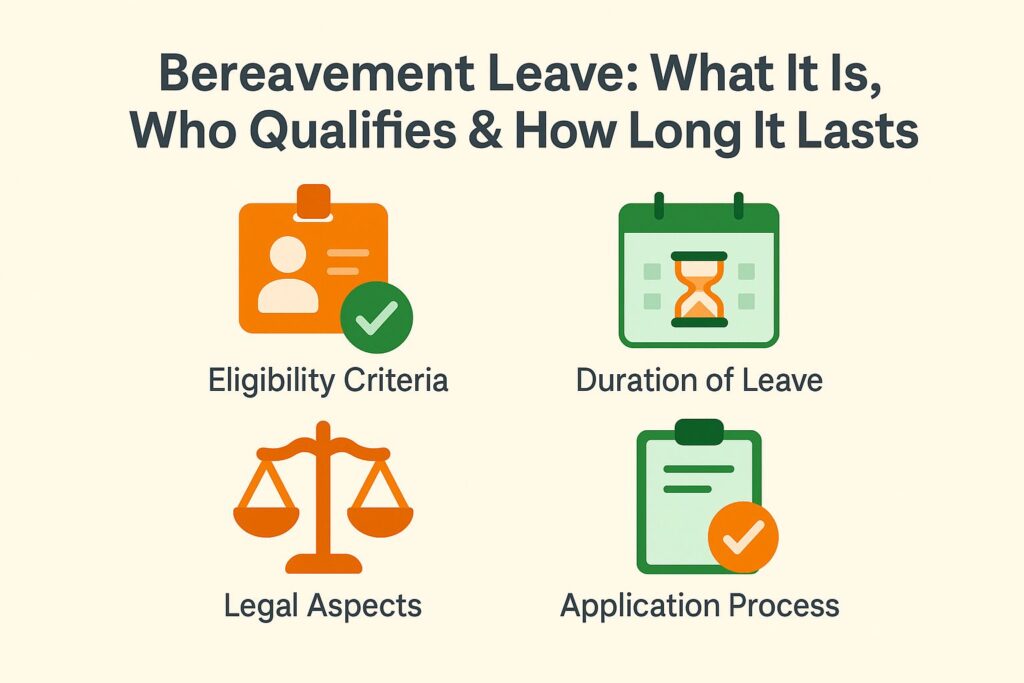
Bereavement Leave: What It Is, Who Qualifies & How Long It Lasts
Losing someone dear can be very difficult, and it’s important to understand your rights regarding time off for grieving. This time off lets you mourn and deal with the necessary arrangements after a loss. You’ll find out who can take this leave, how long it usually lasts, and the laws that might impact you. Want to learn how to discuss this delicate subject? Let’s explore the details together.
What Are Bereavement Benefits: Explanation and Why They Exist
Bereavement leave allows qualified employees to take time off when a family member passes away, ensuring they can manage their grief without the stress of workplace obligations. It is considered a compassionate leave, providing essential emotional support during a personal tragedy.
This leave is important for helping employees during hard times, as it allows them to cope with the death of a loved one and care for their mental well-being while handling family responsibilities.
Organizations typically offer varying lengths of bereavement leave, often ranging from three to five days for immediate family members. Some companies provide resources such as counseling services or support groups to aid in the grieving process.
Setting up a clear bereavement leave policy shows care and can improve the mood and efficiency at work, helping employees come back with renewed energy and concentration.
Eligibility for Bereavement Leave: Qualifying Criteria and Specific Criteria
Knowing who qualifies for bereavement leave is important for both employees and employers, as it sets the basis for respectful workplace policies.

Who Qualifies?
Typically, qualified employees include full-time staff who have been with the company for a minimum period, often 30 days, but specific eligibility may vary by company policy.
For example, some companies may also extend eligibility to part-time employees who work a certain number of hours weekly or to interns who have been with the organization for an extended period, like three months.
It’s important to check your company’s employee handbook or talk to HR for exact requirements, as differences can greatly affect whether you qualify for benefits like health insurance, bereavement leave eligibility, or other leave policies.
Consider any probationary periods that may apply before full benefits kick in.
Types of Relationships Covered
Most bereavement leave policies cover immediate family members, including parents, siblings, children, and spouses, though definitions can vary widely.
Some companies extend coverage to include grandparents, in-laws, and even close friends, recognizing diverse family structures. Therefore, it is necessary to carefully check your company’s bereavement leave policy.
For example, an organization might allow leave for the death of a close cousin, while others may not. Reaching out to HR for details can help you know your rights.
Quickly document your leave request and collect any necessary forms to make the process smoother during a challenging time.
Duration of Bereavement Leave
The duration of bereavement leave varies widely. Many companies give 3 to 5 days for close family members, while some offer up to 10 days or more, reflecting diverse workplace accommodations for a mourning period.

Typical Length of Leave
Most organizations provide between 3 to 5 days of paid bereavement leave, which often may not be enough for employees to fully cope with their loss.
Studies indicate that many professionals feel emotionally unprepared to return to work after such a significant life event. Extended leave, typically ranging from 7 to 14 days, can lead to better recovery and improved morale.
For example, organizations like Google offer up to 10 paid bereavement days, reflecting a commitment to employee well-being. Companies may consider flexible arrangements, such as remote work or gradual reintegration, to support grieving employees.
Following these practices can help create a more caring workplace environment.
Variations by Employer
Employer policies can vary widely, with some offering additional unpaid leave or flexible arrangements for employees who need more time to grieve.
For example, companies like Google provide up to 12 weeks of paid bereavement leave, reflecting a strong commitment to employee well-being. In contrast, smaller firms may offer only a handful of unpaid days, which can add stress during an already challenging time.
It’s important for employees to easily talk about these policies and feel at ease discussing their needs. Employers can offer clear bereavement leave rules that explain what options and help are available, assisting employees in dealing with this sensitive matter.
Legal Aspects of Bereavement Leave
Bereavement leave rules can be complicated, involving federal rules and state laws that define what employees are entitled to.
Federal vs. State Laws
While there are no federal laws mandating bereavement leave, many states have enacted specific regulations that require employers to provide time off for grieving employees.
For example, California mandates up to five days of bereavement leave for employees after the death of a family member.
Similarly, New York City requires employers to provide paid bereavement leave to employees after the loss of a close relative.
It’s essential for employers and employees alike to stay informed about local regulations, as they can vary significantly. Checking state labor department websites regularly or talking with HR professionals can help learn the rules and support grieving employees.
Company Policies
Policies on bereavement leave can greatly affect employees’ rights and what they expect. HR should establish clear and consistent rules. This ensures everyone understands the guidelines for bereavement leave and how employees receive information.
Effective bereavement leave policies typically offer time off that accommodates various circumstances, such as the death of immediate family members or close friends.
For example, a leading tech firm may provide five days of paid leave for immediate family and three for extended family, ensuring employees have adequate time to grieve.
HR is important because it clearly explains these policies to new employees and keeps them informed with regular updates, reducing misunderstandings. Offering counseling resources can further support employees during these challenging times.
Application Process
Applying for bereavement leave can be hard, but knowing the steps can make it a bit easier during tough times.

How to Request Leave
To request bereavement leave, employees should follow their company’s established procedures, typically involving notifying HR and submitting a written request.
Begin by informing your immediate supervisor as soon as possible, providing the reason and anticipated duration of your leave.
Follow up with the Human Resources department, either via email or phone, to inquire about specific forms and timelines.
Typically, it’s respectful to submit any official written request within one week of your loss. Be sure to attach supporting documentation, such as a death certificate if requested.
Good communication during the process helps make sure your request is dealt with quickly and with care.
Required Documentation
Most companies require some form of documentation when applying for bereavement leave, such as a death certificate or obituary to validate the request.
Plus a death certificate or obituary, you may also need to provide proof of relationship, like a marriage license or birth certificate.
Some employers request a signed statement from a family member or a funeral home receipt.
To get these documents ready quickly, begin by collecting the required paperwork as soon as possible. Make sure all information is clear and organized, as neat paperwork can speed up approval and lower stress during difficult times.
Importance of Bereavement Leave
Giving time off for bereavement helps employees cope with their loss and improves workplace morale and commitment.
Many companies now realize the importance of bereavement leave and have established clear policies for it. For instance, Google offers up to 15 days of paid leave, allowing employees the necessary time to cope.
Patagonia offers unlimited bereavement leave, showing their trust in employees and significantly improving their happiness at work. These examples highlight how well-structured bereavement policies can lead to reduced turnover rates and a more committed workforce.
By focusing on employees’ emotional health, organizations create a supportive atmosphere that spreads across the workplace.
About the Author
Kim Anderson is a Harvard University graduate with a bachelor’s degree in Accounting and Finance. She’s the owner of a successful payroll outsourcing firm based in California and a contributing writer for My Payroll Outsourcing. With 14 years of experience, Kim helps businesses streamline compliance, minimize administrative risk, and manage multi-state workforces with confidence.

